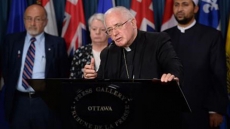OTTAWA — Student groups say young voters — a group that typically registers some of the lowest turnout levels in the country — cast more ballots in last week's federal election than they did four years ago.
The Canadian Alliance of Student Associations estimates that youth voter turnout was up by about 10 per cent since 2011, based on consultations with member campuses.
The exact number won't be known until Elections Canada releases detailed breakdowns of voter turnout in the coming months.
Elections Canada numbers show 70,231 people came out to special offices set up on 38 campuses during a four-day stretch prior to advance voting, which took place over the Thanksgiving long weekend.
The offices were established as part of a pilot project to get more students out to vote.
The Canadian Federation of Students said the wait time at some campuses was as long as an hour: More than 400 students crammed the special office on the Ryerson University campus in downtown Toronto on the Wednesday before the long weekend, while Memorial University in St. John's saw 1,100 students line up out the door on the last day the office was open.
CFS national chairperson Bilan Arte said the numbers help to undermine the reputation of young people as politically apathetic.
The figures have emboldened student groups to lobby the incoming Liberal government to make it easier to pay for post-secondary school and to create jobs for young people upon graduation.
"We need to make sure that the Trudeau government not only does what it said it would do, but actually goes beyond that," Arte said.
Viviane Bartlett, CASA interim executive director, said students believed they had their voices heard during the election and her group "will be here to ensure the government continues to listen during their four-year mandate."
The Liberals have made sweeping promises to make it easier for students to pay for school and to get a job upon graduation.
The Liberals have promised to spend $1.47 billion over four years on a youth job strategy that promises to create 40,000 jobs for young people in each of the next three years and waive employment insurance premiums for 12 months for businesses who give a full-time job to anyone 18 to 24.
The Grits are also planning to eliminate education tax credits for books and put the approximately $2 billion in savings towards non-repayable grants to students, a move student groups say should make it easier to pay for an education.
"But it doesn't do very much to actually address the systemic issues that we have around access across the country," Arte said. "It doesn't address high tuition fees that continue to skyrocket from coast to coast. It doesn't present a national vision for post-secondary education."
Those issues are likely to come up when CASA officials wander on to Parliament Hill as part of their annual lobbying blitz where they have some 150 meetings with cabinet ministers, MPs, senators and top civil servants.
"Our job really is to work with the government in a collaborative manner to ensure that there is an investment in the issues that matter to students," Bartlett said.




